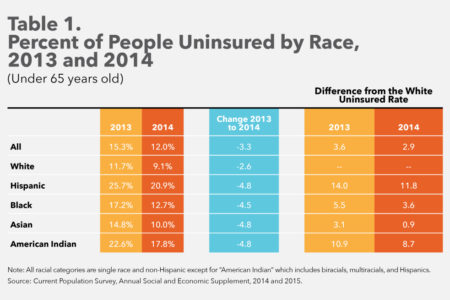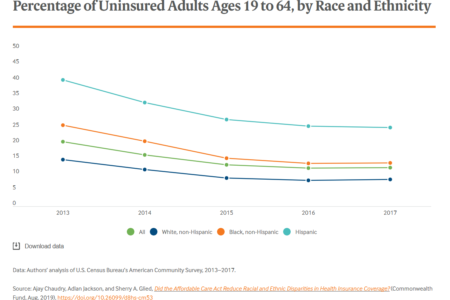
Share On Social!
When the Obama administration passed the Affordable Care Act (ACA) in 2010, one of its main goals was to expand healthcare insurance access, especially to uninsured, mid- to low-income Americans — a classification in which many Latinos find themselves.
Since that time, the ACA provided millions of Americans with health insurance coverage, primarily through an expansion of Medicaid eligibility and subsidies for private coverage purchased through the legislation’s marketplaces. The ACA has expanded and improved coverage options for people without access to a job-based health plan, the law mostly left the employer market alone.
“All racial groups have experienced substantial increases in their health insurance coverage,” Algernon Austin, with the Center for Global Policy Solutions (CGPS) writes. “Before the ACA was enacted, people of color were much more likely to be uninsured than Whites. Obamacare has reduced these disparities and has essentially eliminated the difference between the uninsured rates of Asian Americans and Whites and of Black and White children.”
Update 6/26/20: Trump administration files Supreme Court case to strike down the ACA.
Did the ACA Improve Healthcare Access?
Yes. Especially for people of color.
Latinos and other minority groups’ healthcare insurance coverage rates saw substantial gains between 2013 to 2017, according to the Keiser Family Foundation. They note that this increase in numbers will likely lead to a reduction in the overall inequities these communities face.
Still, despite improvements in absolute disparities over time, significant gaps in the un-insurance rate remained for blacks and Hispanics, compared to whites, in expansion and non-expansion states.
One way to potentially close that gap is by expanding healthcare programs, or at least that’s what some studies show, according to the CGPS. Their recent study illustrates how the ACA has reduced the disparities in health coverage.

“The Affordable Care Act will lower uninsured rates for all, but racial and ethnic disparities in health insurance coverage between White and non-White populations will remain,” Austin writes. “After the main ACA provisions went into effect in 2014, coverage disparities declined slightly as the percentage of adults who were uninsured decreased by 7.1 percentage points for Hispanics, 5.1 percentage points for Blacks, and 3 percentage points for Whites.”
What Is Latino Enrollment in the ACA?
Many Latinos—over 4 million, to be exact—have access to critical healthcare coverage under the ACA’s policy guidelines.
Before this legislation, Latinos had the highest initial uninsured rates among their peers, according to a recent study by Commonwealth Fund. Using the U.S. Census Bureau’s American Community Survey, they also found that Latinos experienced the most significant increases in coverage rates.
“The proportion of nonelderly adults lacking health insurance fell from 20.5 percent in 2013 to 12.3 percent in 2017, a decline of 40 percent, while racial gaps decreased,” Commonwealth Fund states.
“Gaps in insurance coverage among racial and ethnic groups narrowed extensively after implementation of the ACA coverage expansions, and especially between 2013 and 2016. Uninsured rates in states that expanded Medicaid eligibility under the ACA fell 49 percent, compared with 27 percent in nonexpansion states.”
Could Ruling Against ACA Affect Latinos

Yes. And despite radical gains in coverage and decreasing disparities, the Trump administration is aiming to weaken the ACA.
Their main goal?
To reverse this piece of legislation.
“The United States just filed its brief in the major constitutional challenge to the Affordable Care Act that will be argued next term,” according to a tweet from @SCOTUSblog on June 26, 2020. “The government says the entire ACA is invalid but leaves room for the court to leave in place certain provisions that don’t harm the plaintiffs.”
Reversing the ACA could have seriously detrimental impacts on Latinos. According to experts and research, the ACA, and expanding Medicaid in all states, was critical in reducing the health disparities among that community.
“This would also lead to ~20 million Americans losing their health insurance in the middle of a [coronavirus] pandemic without a replacement plan, let alone one with a chance of becoming law,” according to a tweet from NBC News reporter Sahil Kapur.
Explore More:
Healthcare AccessBy The Numbers
142
Percent
Expected rise in Latino cancer cases in coming years



